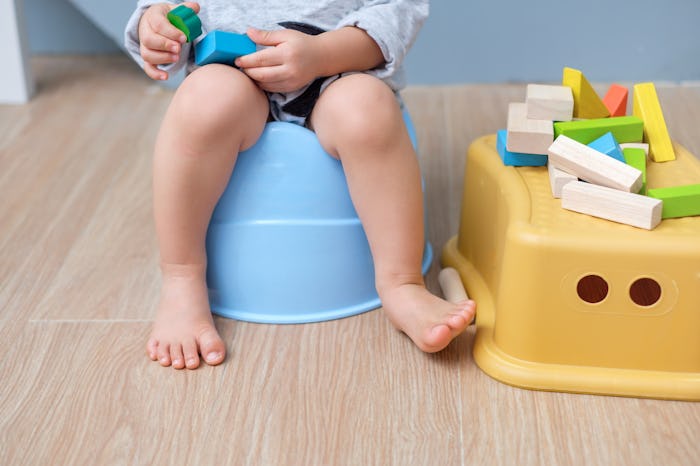Life

How To Potty Train Over A Weekend, Because Changing Diapers Gets Old
Potty training is probably one of those things that all parents of young children dread. Let's face it — there's nothing fun about cleaning up endless accidents and doing endless laundry (especially when said laundry is covered in pee and poo). Lately, when talking about potty training, the rage in the parenting world surrounds methods that suggest quick results. You might wonder how to potty train over a weekend, and whether it really works. Is weekend potty training the thing to try, or is it too good to be true?
According to pediatrician Dr. Sarah Kohl, MD, potty training in two or three days is popular now. "It requires an intense weekend where nothing is done besides having your child run around without clothing on their lower half," she tells Romper. The thought is that through trial and error, the child learns how their body works, and the expectation that the child will use the toilet.
"The entire weekend (day and night) is focused on toileting," Kohl continues. "The entire weekend you are plying your child with beverages so that they go often, and hopefully, learn to use the toilet." For some children this works well, and they can be successfully (approximately 80 percent mastery) potty train over the course of a long weekend.
"Always keep toilet training relaxed, positive, consistent, and happy," adds Kohl, "because your child learns best when you show your support and rejoice in their newly acquired skills."
But, because all kids are different and respond to approaches in different ways, it can't be assumed that this method is always successful for all kids. "Many children are overwhelmed with the task and do not successfully learn in such a short period of time," notes Kohl. "The pressure is too great for them."
Be as sure as you can that your child is ready to be potty trained before attempting a bootcamp-style training weekend. Potty training, using any method, is most often successful when the child is ready and wants to be potty trained, notes Kohl. "Potty training can be very stressful for children, and it's important that you don't force it just because you are ready. After all, your child is in charge of their pee and poop — you are just helping them learn when and where to put it," she continues.
Readiness signs for potty training include: interest in using toilet, successfully eliminating in the toilet, talking about using the toilet, and prolonged periods of dryness during the day (even with diapers on). Toilet training requires that a child be developmentally ready and have strong body awareness, and this takes time and cannot be rushed. They also need the cognitive and verbal skills to communicate the need to use the toilet. "This includes the cognitive and emotional maturity to interrupt play and use the potty when the urge arises," mentions Kohl.
Trying to potty train before age 2 is often unsuccessful. The average age in the USA is 29 months for girls and 31 months for boys — some are trained earlier and some later. Pushing your child before they are ready often sets parents and children up for a confrontational and unsuccessful experience, and may even prolong the training process. Forcing potty training when your child is not ready can also result in a child withholding their pee or poop, which is not a healthy situation.
Ultimately, your child's personality, preferences, and abilities will play a huge role in how and when they become potty trained. If your child is more casual or absent-minded, a weekend bootcamp may not be the best way to get them trained. If your child likes to be in control (Have you met one that doesn't?), you will likely have to adjust your approach in order to get them to buy in. If your child has true anxiety or fear (many fear that they may fall in, and many are anxious about the feeling of pee and poop freely falling, as opposed to being caught by a diaper immediately), you will probably have to take a lighter approach to potty training.
You know your kid best, and taking an objective approach to potty training will result in the most sucessful experience for you both. And, rest easy, you'll get out of changing those diapers sooner or later.
Check out Romper's new video series, Romper's Doula Diaries:
Check out the entire Romper's Doula Diaries series and other videos on Facebook and the Bustle app across Apple TV, Roku, and Amazon Fire TV.